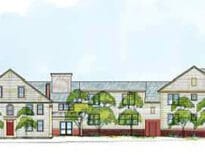
Some suburban officials are asking whether they can afford to give up money from a few state grant programs in order to avoid permitting new multifamily housing.
It’s the most ambitious attempt yet to grapple with the Bay State’s chronic housing shortage and the sky-high rents and prices it has fueled.
In a bid to spur the construction of hundreds of thousands of new apartments, condominiums and homes near MBTA train stations and bus stops across Greater Boston, the Baker administration in December rolled out proposed regulations for the state’s newly minted “MBTA Communities” initiative.
But barely two months after the draft regulations hit the street, trouble is brewing. Officials in some cities and towns are openly discussing whether they really need to comply with the law, or can simply go their own, merry NIMBY way.
Newton Leads the Way
The most prominent example involves Newton City Councilor Chris Laredo, who wound up taking heat on Twitter after a clip was posted online of his comments at a public meeting.
In particular, Laredo said the rules would limit the city’s ability to “manage and control what gets built here” since developers would be able to build apartments and condos by right, instead of having to obtain a special permit.
Under the new law, cities and towns deemed “MBTA communities” are required to create a multifamily housing zone of at least 50 acres within a half mile of their local T station that can hold at least 750 units of new or existing development. If they don’t, they lose access to a handful of state infrastructure grant programs, including MassWorks.
“I think we need to weigh that against, in my mind, what is a very small amount of funding at stake,” Laredo said.
He’s not alone, though, in this line of thinking. Officials in Milton, Belmont and Arlington having engaged in similar discussions, said Jesse Kanson-Benanav, executive director of Abundant Housing Massachusetts. The group launched in earnest last spring to push for more housing construction across the state.
In addition, Northborough Planning Board members have also discussed their options, meeting records show.
“Our members are sharing as they hear things.… It’s spreading,” Kanson-Benanav said, adding that thanks to the Newton incident, “other people with bad intentions are catching on.”
The comments by local officials looking for a way around the new law, in turn, has exposed what may be a key weakness: penalties that don’t have enough of a bite to them.
Is Penalty Big Enough?
The Baker administration’s new MBTA Communities initiative differs from past efforts by previous governors to spur construction in that it attempts to spur cities and towns to take action through a stick, rather than carrots.
Launched in 2004, the 40R program attempted to sweet-talk cities and towns into letting more housing get built, offering incentive payments to communities based on the number of new units zoned for and built near train stations.
But there were never enough takers, with just 3,000 or so of a potential 30,000 units ever built under the program, with many suburbs and towns remaining resistant to new housing, especially of the multifamily variety.
Learning from past mistakes, the new MBTA Communities takes a different tack. But while the stick is there, whether it is big enough to convince exclusionary local officials to change their ways and open the door to thousands of new apartments and condos remains to be seen.
‘Yes’ Must Drown Out ‘No’
While MassWorks is popular enough, it distributed just $68 million to roughly three dozen communities in 2020, meaning most Boston-area cities and towns that year got zilch.
That group includes Northborough, where officials, in discussing compliance with the new law, noted the town didn’t receive any grant money from the program.

Scott Van Voorhis
That stands in contrast to the $1 billion in local aid distributed each year by the Massachusetts Lottery.
If the current penalties don’t prove strong enough, Abundant Housing Massachusetts’ Kanson-Benanav would like to see the state housing officials consider cutting off access to other grant or aid programs as well.
In the meantime, Kanson-Benanav’s group is marshalling its members and encouraging them to speak before their local city and town councils and planning boards to urge compliance with the new law.
“People are more motivated to get involved in things they oppose rather than things they support,” he said. “We really need to be proactive, so the ‘no’ voices on compliance with this law are not drowning out the ‘yes’ voices.”
Scott Van Voorhis is Banker & Tradesman’s columnist; opinions expressed are his own. He may be reached at sbvanvoorhis@hotmail.com.






